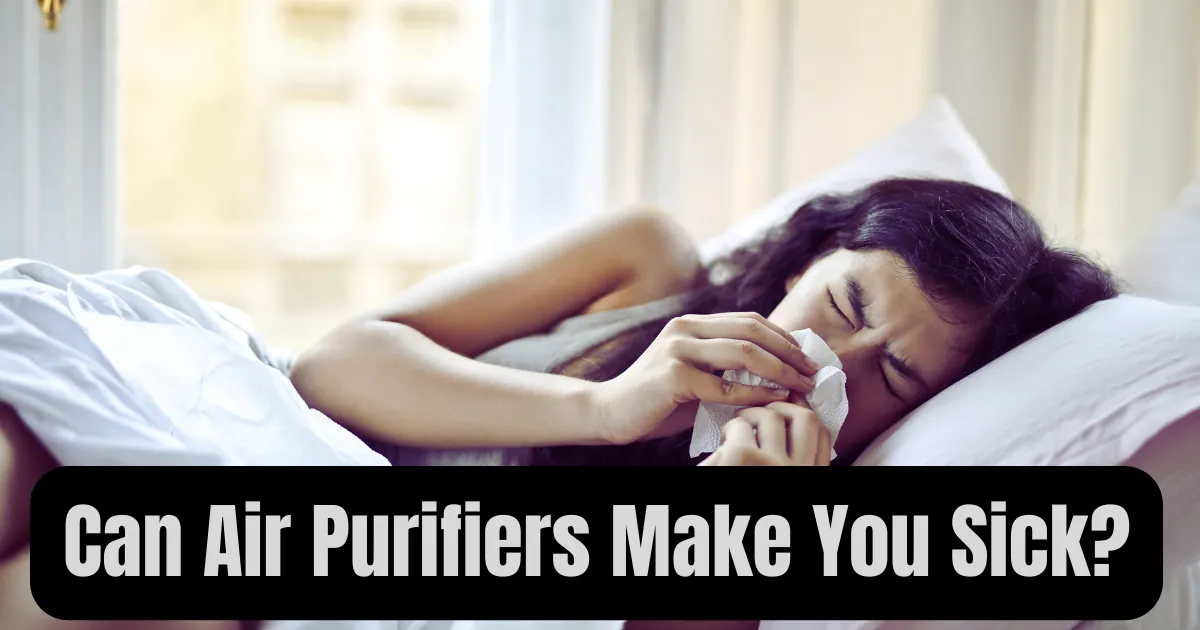Can air purifiers make you sick? This question often comes up in your mind when you are looking for the benefits and drawbacks of using air purifiers in your homes and workplaces.
The short answer is no, air purifiers do not make you sick. Their main purpose is to improve air quality and create a healthier environment in your homes.
However, it is important to consider some factors to ensure that air purifiers work effectively and don’t cause any harm.
Let’s discuss in detail and learn how air purifiers can improve your health.
Contents
- 1 Can air purifiers make you sick?
- 2 Reasons Why Air Purifiers Can Make You Sick
- 3 How to Avoid Air Purifier Sickness
- 4 Tips for Choosing a Safe Air Purifier
- 5 Symptoms of Air Purifier Sickness
- 6 Negative Side Effects of Air Purifiers
- 7 Benefits of Air Purifiers
- 8 Who Is Most at Risk of Air Purifier Sickness?
- 9 Conclusion
- 10 FAQs
Can air purifiers make you sick?
The good thing is that air purifiers do not make you sick when you use them properly. In fact, they can help you to improve air quality and create a healthy environment in your home.
Air purifiers remove particles and contaminants from the air, such as pollen, mold spores, duct, and pet dander. Additionally, they can help in reducing the presence of dangerous pollutants including smoke and volatile organic compounds (VOCs) and unpleasant odors.
However, it is important to choose the right type of air purifier according to your needs and make sure you utilize it properly. Some air purifiers produce ozone, which can be dangerous in high amounts. It’s important to choose an air purifier with low or no ozone emission levels.
Sometimes people who already have respiratory issues or sensitivities may feel a little uncomfortable or irritated while using an air purifier for the first time. This may be because allergens and irritants were first removed from the air, causing temporary symptoms. However, this is not a common occurrence, any discomfort should rapidly go away as your body gets used to the fresher air.
In the article “Environmental Health Perspectives,” those who have asthma may experience respiratory issues as a result of ozone-producing air purifiers.
According to research in the “Allergy” journal, some users of ionization-based air purifiers may experience headaches and sore throats.
Reasons Why Air Purifiers Can Make You Sick
Generally, air purifiers are very beneficial, but there are some reasons which can make you sick. Here are those reasons.
- Ozone Emissions: Ozone is produced as a byproduct by some air purifiers. Ozone exposure at high levels may harm the respiratory system and cause symptoms including coughing, wheezing, and difficulty in breath. It’s important to pick an air purifier that either produces ozone at safe levels or doesn’t emit it at all.
- Filter Contamination: Air purifiers with poor filtration systems may accumulate contaminants on their filters over time. When the filters are not regularly cleaned or replaced, the collected pollutants may be released back into the air. Breathing in these pollutants may worsen pre-existing respiratory problems and cause respiratory distress.
- Chemical Sensitivity: The chemicals used in air purifiers can cause hypersensitivity in some people. Some purifiers emit volatile organic compounds (VOCs), which can cause allergic responses, headaches, and other symptoms in sensitive people. Choosing air purifiers with minimal VOC emissions or using natural air purifying alternatives can help prevent negative effects.
How to Avoid Air Purifier Sickness
To minimize the risk of air purifier sickness and ensure a healthy indoor environment, consider the following precautions:
- Choose a Reliable Brand: Choose the air purifiers from a reputable brand that is known for their quality and safety.
- Read Product Reviews: Read user reviews and ratings before making a decision to get an understanding of the effectiveness and potential negative effects of the air purifier you are thinking of buying.
- Proper Maintenance: Filters should be regularly cleaned or replaced according to the manufacturer’s recommendations to avoid the accumulation of pollutants and to maintain maximum efficiency.
- Monitor Air Quality: It is important to invest in an air quality monitor to check your air purifier’s efficacy and make sure it is producing the desired results.
- Ventilation: The quantity of pollutants in your house or office can be reduced through proper ventilation. To breathe in fresh air, open windows or turn on exhaust fans.
People Also Read: Do air purifiers make the air dry?
Tips for Choosing a Safe Air Purifier
Consider the following tips before choosing a safe air purifier.
- Look for HEPA Filtration: Look for an air purifier with a high-efficiency particulate air (HEPA) filter. HEPA filters are very effective for capturing microscopic particles such as pollen, dust, and pet dander and ensure cleaner air without producing any harmful byproducts.
- Consider Filter Maintenance: Verify whether the filters on the air purifier are easy to clean or replace. In order to prevent the accumulation of pollutants and preserve the purifier’s effectiveness, regular filter maintenance is necessary.
- Avoid Ozone-Producing Purifiers: Select air purifiers with low or “ozone-free” emissions certifications. Select models that follow the requirements set by trustworthy organizations like the California Air Resources Board (CARB).
Symptoms of Air Purifier Sickness
Air purifier sickness, although it is uncommon, can come with a variety of symptoms. After using an air purifier, if you have any of the following symptoms, it could be an unhealthy reaction:
- Respiratory Irritation: When an air purifier releases particles or irritants into the air, it can cause coughing, wheezing, throat irritation, and breathing difficulties.
- Allergic Reactions: The growth of skin rashes, watery eyes, congestion in the nose, and sneezing is a result of exposure to allergens that the air purifier was unable to completely eliminate.
- Headaches and Dizziness: Some people may experience headaches, dizziness, or lightheadedness when exposed to certain chemicals emitted by air purifiers.

Negative Side Effects of Air Purifiers
Although air purifiers can enhance indoor air quality, it’s important to be aware of any possible side effects. Here are a few drawbacks to keep in consideration;
- Noise: Some air purifiers can generate noticeable noise, especially at higher fan speeds. This can be bothersome, particularly during nighttime or in quiet environments.
- Energy Consumption: Air purifiers can use a lot of energy, which increases power bills, depending on the model and settings.
- Limited Coverage: Air purifiers have a limited coverage area, and using them in large rooms or open spaces may not provide optimal results. Multiple units might be required to effectively purify the air in larger areas.
Benefits of Air Purifiers
While air purifiers have some potential risks, when used properly they can give several benefits, including these:
- Allergen Reduction: HEPA filters are effective at capturing allergens like pollen, dust mites, and pet dander.
- Asthma Relief: Air purifiers reduce asthma symptoms and improve respiratory health by removing asthma triggers such as dust, mold spores, and volatile organic compounds.
- Odor Elimination: Air purifiers with activated carbon filters can effectively eliminate unpleasant odors caused by cooking, pets, or smoke.
Who Is Most at Risk of Air Purifier Sickness?

While anyone can potentially experience adverse effects from air purifiers, certain individuals may be more susceptible. Precautions should be taken by people who have the following conditions or characteristics:
- Respiratory Conditions: People who already have respiratory disorders like asthma, chronic obstructive pulmonary disease (COPD), or allergies may be more sensitive to the air quality changes caused by air purifiers.
- Chemical Sensitivities: Those with chemical sensitivities or multiple chemical sensitivities (MCS) should carefully select air purifiers with low emissions to avoid triggering symptoms.
Conclusion
In conclusion, the question, “Can air purifiers make you sick?” warrants careful consideration. While air purifiers offer numerous benefits in improving indoor air quality, certain factors can potentially lead to air purifier sickness. You can easily enjoy the benefits of cleaner, healthier air without compromising your health by understanding the causes of these dangers and following important advice for choosing a safe air purifier, being aware of symptoms and negative effects, and taking the required protections. Remember, knowledge and informed choices are key to reaping the rewards of air purifiers while minimizing potential risks. Breathe easy and stay healthy!






0 Comments